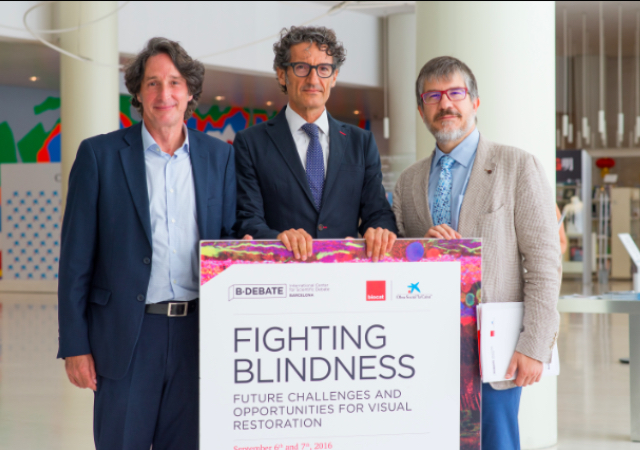Restoring certain types of blindness will be possible over the next decade

The B·Debate on future challenges and opportunities for vision restoration was held on Tuesday 6 and Wednesday 7 September at CaixaForum Barcelona. The principal lines of the congress were set out by Jordi Portabella, the Director of the Research and Knowledge Department of “la Caixa” Banking Foundation; Albert Barberà, the Director of Biocat; and Jordi Monés, the leader of the congress and the Director of the Barcelona Macula Foundation: Research for Vision.
The restoration of certain types of blindness will be possible over the next decade. Developments in research provide new therapies that combine regenerative medicine, gene therapy, photonics and nanotechnology, among others. The new treatments will enable the curing of degenerative retinal diseases, which are the leading cause of vision loss.
«We will eliminate forms of blindness, one by one», says Jordi Monés, the leader of this B.Debate and the Director of the Barcelona Macula Foundation, with regard to some pathologies that so far have lacked a treatment and that we are now starting to control. For those patients who have suffered irreversible deterioration, the only solution for restoring vision will be to repopulate with new cells that integrate themselves into this atrophic tissue. Gene therapy can contribute to the viability of these transplants and attempt to avoid these diseases reaching advanced stages.
Applied research, multidisciplinary collaboration and technology transfer are key factors in ensuring a real impact on society in general and especially on the patients affected by these pathologies. There are 285 million people in the world with vision problems: 39 million are blind while a further 246 million suffer from low vision, according to the World Health Organisation (WHO). The international body has called for the elimination of avoidable forms of blindness by the year 2020.
National and international researchers gathered at CaixaForum Barcelona over the two days of the B·Debate, an initiative of Biocat and la Obra Social “la Caixa”, and led by the Barcelona Macula Foundation, with the collaboration of the Centre for Genomic Regulation (CRG) and the LEITAT Foundation, to discuss the principal scientific developments in the fight against the different forms of blindness.
Macular degeneration is most important blindness condition that is related to age and the ageing of the eye and is the leading cause of blindness in the western world. One in every four people of over 80 years old will suffer from Age-Related Macular Degeneration (AMD), a disease that hinders reading and the ability to recognise faces. In Spain, there are 300,000 people affected. The risk factors are related to the genetics of each person although other factors that are preventable also play a part. These include smoking, excessive exposure to sunlight, poor eating habits and overweight.
Retinitis Pigmentosa is the leading cause of total, degenerative and hereditary blindness, which affects one in every 2,000 people. In Spain, over 15,000 people have retinitis pigmentosa and up to 60,000 people carry the genetic mutations responsible for this disease.
Stargardt’s Disease is an untreatable minority (and hereditary) disease that is the leading cause of macular dystrophy, which affects young people, adolescents and the under-20s. One in every 4,000 people suffer from this disease although they display no symptoms in the early decades of life.
The detailed programme of B·Debate “Fighting blindness. Future challenges and opportunities for visual restoration” is available using this link.
Photo: Edu Ferrer | B·Debate